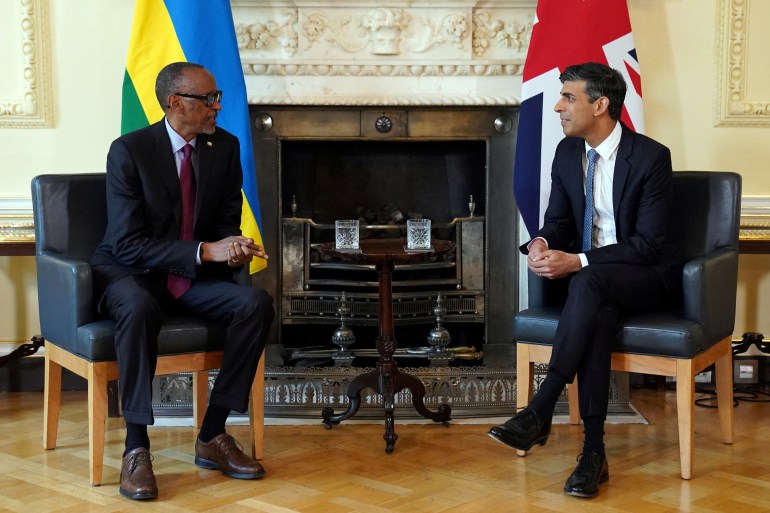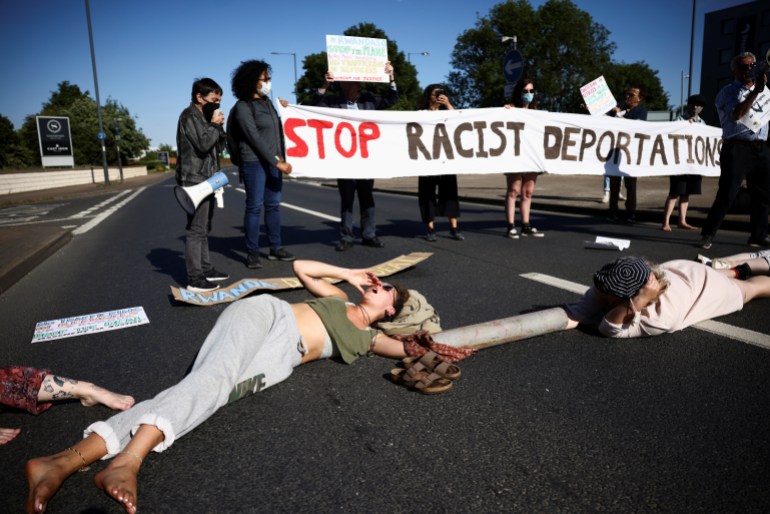UK’s migration bill at odds with international law, says UN
The controversial bill labelled as inhumane by politicians, lawyers and civil rights groups is set to become law.

The United Kingdom’s controversial bill aimed at stopping thousands of migrants and refugees from arriving is at odds with the country’s obligations under international law, the United Nations has said.
The so-called Illegal Migration Bill, which has been passed by parliament and now awaits the formality of “royal assent” from King Charles III, “is at variance with the country’s obligations under international human rights and refugee law and will have profound consequences for people in need of international protection”, the UN refugee and human rights chiefs said on Tuesday.
Keep reading
list of 4 itemsBeyond borders: Migrants online
Tunis police raid sees refugees abandoned near the border with Algeria
‘No turning back’: Carnation Revolution divides Portugal again, 50 years on
The Conservative government’s flagship bill will prevent most people from claiming asylum in the UK without permission and will deport them either to their country of origin or a third nation deemed to be safe, such as Rwanda.
The bill has been stuck in a battle between the UK parliament’s House of Commons and House of Lords, Britain’s unelected upper chamber, which had repeatedly changed the legislation to water it down.
The new migration bill passed by the UK Parliament violates the country’s international human rights and refugee law obligations.
High Commissioner for Human Rights @volker_turk and I share grave concerns in this respect.
Here is our joint statement👇🏻https://t.co/ZI8WTgI84Z
— Filippo Grandi (@FilippoGrandi) July 18, 2023
Among the amendments proposed and finally defeated in the Lords were a demand for shorter time limits on the detention of unaccompanied children, greater protections for victims of modern slavery, and six-month delays in the deportation of migrants.
The plan to deport asylum seekers has been criticised by some opposition politicians, lawyers and civil rights groups as inhumane, cruel and ineffective.
United Nations human rights chief Volker Turk said on Tuesday the bill’s passage raises “very serious legal concerns” and sets “a worrying precedent for dismantling asylum-related obligations” that other countries may follow.

Deportation flights to Rwanda are unlikely to start until next year at the earliest and will still hinge on a ruling by the Supreme Court on their legality later this year.
Britain struck an initial 140-million-pound ($180m) deal with the East African country last year, but the policy has been tied up in the courts. The first planned Rwanda deportation flight was blocked a year ago in a last-minute ruling by the European Court of Human Rights.
The passage of the bill coincided with the arrival on Tuesday of a barge to house migrants and refugees off the southern coast of England
The government has defended the use of barges, insisting they are a cheaper alternative to hotels.
Last year, a record 45,755 people came to Britain in small boats across the Channel, mainly from France. More than 12,000 have arrived this year, a rate similar to 2022.
